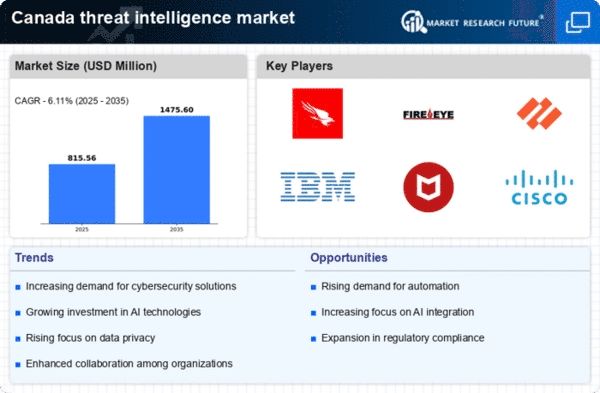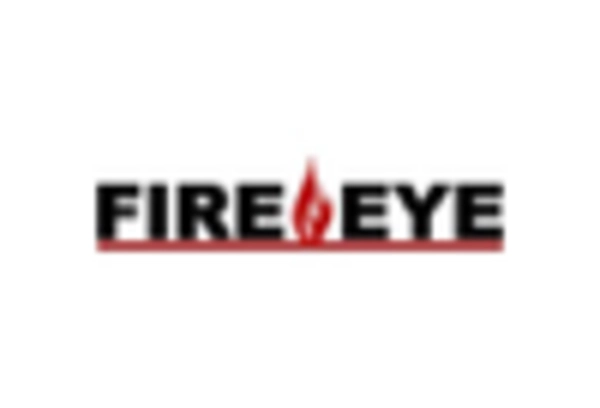Rising Cyber Threats
The escalating frequency and sophistication of cyber threats in Canada is a primary driver for the threat intelligence market. Organizations are increasingly targeted by cybercriminals, leading to a heightened demand for advanced threat intelligence solutions. In 2025, it is estimated that cybercrime could cost Canadian businesses over $10 billion annually. This alarming trend compels companies to invest in threat intelligence services to proactively identify and mitigate potential risks. The threat intelligence market is thus witnessing a surge in demand as businesses seek to enhance their cybersecurity posture and protect sensitive data from breaches. As the landscape of cyber threats evolves, the need for real-time intelligence and actionable insights becomes paramount, further propelling the growth of this market.
Technological Advancements
Rapid advancements in technology, particularly in artificial intelligence (AI) and machine learning (ML), are significantly influencing the threat intelligence market. These technologies enable organizations to analyze vast amounts of data and identify patterns indicative of potential threats. In Canada, the integration of AI and ML into threat intelligence solutions is expected to enhance the accuracy and speed of threat detection. By 2025, the market for AI-driven cybersecurity solutions is projected to reach $3 billion in Canada. This technological evolution not only improves the efficiency of threat intelligence services but also allows for more proactive measures against cyber threats. Consequently, the threat intelligence market is experiencing robust growth as organizations leverage these innovations to stay ahead of emerging threats.
Increased Regulatory Scrutiny
The tightening of regulatory frameworks surrounding data protection and cybersecurity in Canada is driving the demand for threat intelligence solutions. Organizations are now required to comply with stringent regulations, such as the Personal Information Protection and Electronic Documents Act (PIPEDA), which mandates the protection of personal data. Failure to comply can result in hefty fines, potentially reaching up to $100,000 for organizations. This regulatory environment compels businesses to invest in threat intelligence services to ensure compliance and safeguard sensitive information. The threat intelligence market is thus benefiting from this increased scrutiny, as companies seek to implement robust security measures that align with regulatory requirements. As regulations continue to evolve, the demand for effective threat intelligence solutions is likely to grow.
Collaboration with Law Enforcement
The collaboration between private sector organizations and law enforcement agencies in Canada is emerging as a crucial driver for the threat intelligence market. This partnership facilitates the sharing of threat intelligence and enhances the overall security posture of businesses. By working together, organizations can gain insights into emerging threats and vulnerabilities, thereby improving their response strategies. In 2025, it is anticipated that such collaborations will lead to a 25% increase in the effectiveness of threat detection and response efforts. The threat intelligence market is likely to benefit from this trend, as businesses recognize the value of collective intelligence in combating cyber threats. This collaborative approach not only strengthens individual organizations but also contributes to a more secure digital landscape across Canada.
Growing Awareness of Cybersecurity Risks
There is a notable increase in awareness among Canadian businesses regarding the risks associated with cyber threats. This heightened awareness is prompting organizations to prioritize cybersecurity and invest in threat intelligence solutions. Surveys indicate that over 70% of Canadian companies recognize the importance of threat intelligence in their cybersecurity strategies. As businesses become more cognizant of the potential financial and reputational damage caused by cyber incidents, the demand for threat intelligence services is expected to rise. The threat intelligence market is thus positioned for growth as organizations seek to implement comprehensive security measures that include threat intelligence capabilities. This trend reflects a broader shift towards a proactive approach to cybersecurity, emphasizing the need for continuous monitoring and threat assessment.
















